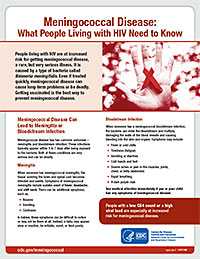Certain Medical Conditions as a Risk Factor
There are certain medical conditions and medications that may weaken the immune system and increase risk of meningococcal disease.
Persistent Complement Component Deficiencies
Ask your healthcare professional which meningococcal vaccines they recommend for you or your child.
CDC recommends people with a persistent complement component deficiency receive two vaccines for protection against meningococcal disease:
- A meningococcal conjugate vaccine
- A serogroup B meningococcal vaccine
Complement component deficiencies refer to disorders of the ‘complement system,’ which helps the body fight off infections. Examples of complement component deficiencies include C3, C5-9, properdin, factor H, and factor D. These disorders are very rare and usually genetic. People who take eculizumab (Soliris®) are also at increased risk for meningococcal disease. Soloris® is most commonly prescribed for treatment of 2 rare blood disorders: atypical hemolytic uremic syndrome (aHUS) and paroxysmal nocturnal hemoglobinuria (PNH). Learn more about the risk of meningococcal disease among patients who take Soliris®.
Functional or Anatomic Asplenia
CDC recommends people with functional or anatomic asplenia receive two vaccines for protection against meningococcal disease:
- A meningococcal conjugate vaccine
- A serogroup B meningococcal vaccine
Meningococcal Disease Fact Sheet: What People Living with HIV Need to Know [2 pages]
This fact sheet describes common outcomes of meningococcal disease, a rare but very serious illness. People living with HIV are at increased risk for meningococcal disease and should get a meningococcal conjugate vaccine.
Someone with anatomic asplenia does not have a spleen (for instance, if it was surgically removed). Someone with functional asplenia has a spleen but it doesn’t work the way that it should. People with sickle cell anemia have functional asplenia. The spleen is an important organ for fighting meningococcal infections because it helps produce antibodies and filter bacteria.
HIV Infection
CDC recommends people living with HIV receive a meningococcal conjugate vaccine. These vaccines provide protection against meningococcal disease caused by serogroups A, C, W, and Y. For HIV-infected people who get meningococcal disease, about 4 out of every 5 cases (80%) are due to serogroups C, W, and Y. A low CD4 count or high viral load increases risk of meningococcal disease for people living with HIV.
- Page last reviewed: March 28, 2017
- Page last updated: July 6, 2017
- Content source:
- Content source: National Center for Immunization and Respiratory Diseases


 ShareCompartir
ShareCompartir
